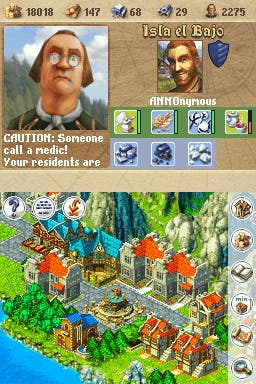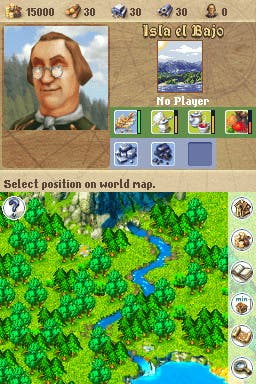Anno 1701: Dawn of Discovery
Pilgrim Fandango.
There's something mildly unsettling about Anno 1701's premise. Unlike, say, The Darkness or Manhunt or Silent Hill which promote and delight in their distastefulness, this Sim City-like DS game hides its dark under a well-lit bushel. It's difficult to put a finger on at first. As you disembark your galleon onto a sunny, yellow shore and set about levelling the land, building houses, churches, pubs, quarries and profits your conscience remains unpricked by the comfortable plod of capitalism.
But, when the first Red Indian chief enters your growing settlement and requests politely that you get the hell out of his country the mask slips. Although it never explicitly says so, this is a game about dark imperialist history in which you mastermind a defiant invasion by stealing land from the indigenous people groups who already call it home.
The game drives you through its excellent and seamless tutorials, and you develop vigour and purpose. These are lands to settle and histories to write, a feeling which presumably mirrors that of those historical European pioneers for whom survival and the establishment of community was of greater importance than appeasement or integration with the natives. The bright presentation, friendly pilgrim-esque character portraits and well-to-do dialogue promote an atmosphere so innocent and orderly that you barely notice the shaky ethical ground upon which you build.
Intentional or not, it's brilliant, enlightening role-play as you steadily grow addicted to expanding your colony into other archipelago islands before building up a military to fend off rivals and subjugate those natives who oppose you. Subtly but forcefully you become a capitalist tyrant, hungry for more power and further dominion, obsessed with defending and promoting that which you've worked hard to create. Videogame metaphors for the birth of contemporary world superpowers don't get much sharper than this.
The game, an original off-shoot from the popular PC series of strategy sims is split into three modes: a campaign comprised of 15 over-arching mission, a versatile endless sand-box mode and multiplayer for up to four players. Newcomers are advised to start with the excellent campaign mode that skilfully imparts first the basics and then the complexities of this ocean deep management experience.

Your first task here is to create resources for a settlement by building a lumberyard to chop down trees. With this wood you can then build houses and in these houses increase your population. Your people need sustenance and so you create a farm for meat and vegetables and deploy sea-fisherman to gather fish. Your people get bored easily so they request a pub for entertainment and a church for spiritual nourishment. Tracking out to the mountain range a mile north of your position you chisel out a stone quarry to enable the paving of streets to link up each of your formative structures and, in no time at all, you have created your own micro-civilisation.
As your settlement grows and flourishes your inhabitants segregate into classes: Pioneers, Settlers, Citizens, Merchants and Aristocrats. All of the building and development is funded by taxing these various groups and it's possible to micromanage their taxation quickly and easily. A set of sliding scales demonstrate how much income you can get away with siphoning from each group, and this limit increases with their happiness and contentment. For example, without a tea plantation your settlers might grow homesick and unhappy and, as such, the amount of taxes you can charge them is limited. Much of the game comes down to finding out your inhabitants' needs and wants, providing for them and then taxing their ensuing happiness to generate income with which to further expand.
There are five levels of civilisation to progress through with your inhabitants' demand for goods and public buildings developing (into, for example, theatres and swimming baths) at each stage. As in real life the more developed your civilisation the more demanding your inhabitants become and this provides a solid difficulty framework into which the game slots. Pirates and invaders, against whom you must raise an army of soldiers to protect and serve your communities, impose further difficulty. Troops you create can be stationed in buildings to defend against attackers and, likewise, sending a warship over to a neighbouring and attempting to take control of their buildings will net great rewards.

What stands out right from the off is quite how well the game works on the DS. Other strategy sims for the platform, such as Theme Park, are direct ports of PC titles and so often struggle to comfortably transfer their interface design. Anno 1701, by contrast, is a bespoke DS title. As such the game is a joy to control. Speeding around an island by simply dragging and flicking the stylus is quick and responsive, something which the developer had to get right when you consider the tiny and cramped window the DS screen opens onto this world. All of the necessary information and menus are a logical tap away and yet the screen never feels cluttered. About the only frustration is that you can't rotate your isometric view, which can prove trying when trying to lay roads around and behind your settlements. Nevertheless, the game not only works with stylus control but excels in it to the point that, in many ways, it's preferable to orthodox mouse control.
It's difficult to get lost in this game. A question mark icon in the bottom left hand corner of the screen offers context sensitive help on any menu or object currently selected. Likewise a question mark icon appears over each building when selected and touching this grants tips and advice should you have a specific problem with the structure. A book icon discreetly tucked into the right hand side of the screen lets you know your current main objective as well as listing all of the smaller objectives required for its completion. Finally, by pressing the start button you can call up the ANNOpedia, a huge reference area in which every element of the game is unpicked and explained.
Anno 1701 is a spectacular DS game, which the developer has clearly worked hard at tailoring to the platform and its audience. For dedicated PC strategy nerds it might seem a little lightweight in comparison to what the desktop platform currently has to offer but, for accessible, deep, pocket-sized empire-building this is a game hard to fault.

